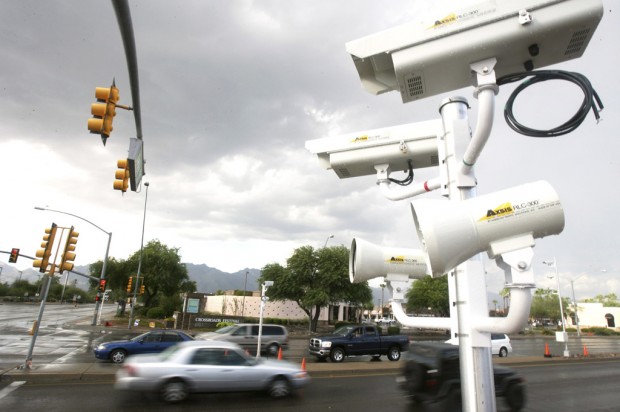Early results have Tucson voters opting to kill the controversial red light cameras operating in eight intersections, but their death will not be immediate.
Tucson City Attorney Mike Rankin said he expects the red light cameras operating eight intersections won't be turned off until Nov. 19, a few hours after the Tucson City Council votes to certify the election results.
If approved, the measure will also mothball the white boxy vans the city uses as its mobile photo radar units.
But until the City Council can certify the election results in two weeks, the cameras will continue to operate, said Rankin.
At the moment, election results have 65 percent backing Proposition 201 to ban the cameras.
The referendum on the cameras has no impact on those who have a ticket or get one in the mail in the coming weeks or months. There is a several-week delay from when the photo is taken and when the ticket arrives in the offender's mailbox.
The city has been operating on a month-to-month contract with the Tempe-based American Traffic Solutions.
In 2014, the red light cameras and photo radar generated 26,476 tickets and generated $2.39 million for the city in the last fiscal year.
The citizen-led initiative to put Proposition 201 on the ballot was the brainchild of former state legislator John Kromko.
Kromko's group, Tucson Traffic Justice, helped to turned in more than 40,000 petition signatures to get the issue on the ballot.
Kromko rejected pleas that the removal of the cameras would lead to increased car accidents, calling it a "myth."
"People should not worry that there will be more accidents or fatalities," Kromko said in prepared statement.
"When cameras are removed, typically nothing at all happens, except that people have more money in the pockets. This is what happened when Pima County removed their cameras a year and a half ago," he said.
Tucson Mayor Jonathan Rothschild had asked voters to vote against the measure, stating "red light cameras save lives."
In his argument, he cited the Insurance Institute for Highway Safety, which states the cameras reduced the fatality rate from the running of red lights by 24 percent.
Councilman Paul Cunningham said Tucsonans recognized the red light cameras was largely flawed program.
"We did everything we could to make it a better program. The problem is that it was not a good program. We weren't getting enough money and American Traffic Solutions was basically getting rich on the backs of Tucson citizens and that's what Tucson citizens figured out," he said.





